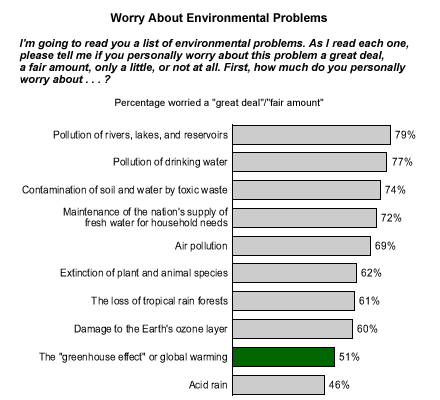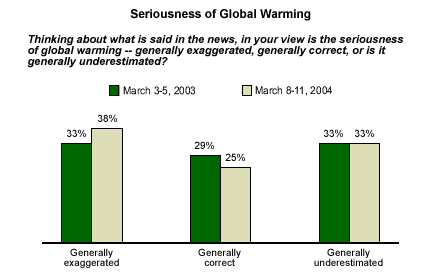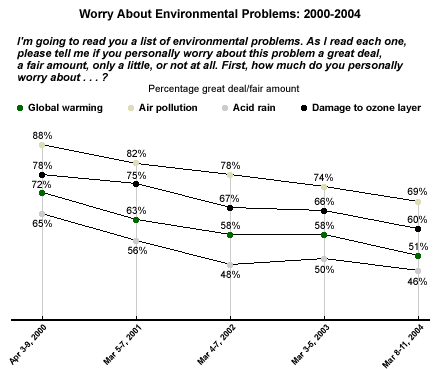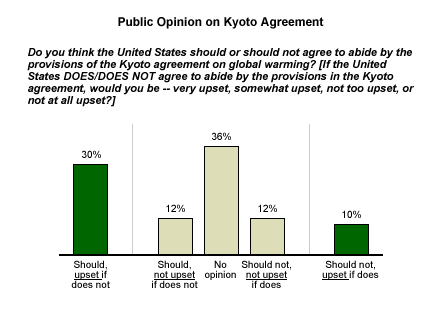Last year at this time, Â鶹´«Ă˝AV reported that global warming was "a bit of a yawn" to most Americans. Today, one might say the public is practically dozing.
The percentage of Americans who worry "a great deal" or "a fair amount" about the "greenhouse effect" or global warming slipped seven points over the past year, from 58% in March 2003 to 51% today. Nearly as many (47%) now say they worry "only a little" or "not at all" about the issue.
As a result, global warming ranks near the bottom of the list of specific environmental issues for which Â鶹´«Ă˝AV measured public concern in this year's annual Environment poll, conducted March 8-11*. The related problem of damage to the Earth's ozone layer is rated only slightly higher. Water pollution, toxic waste, and air pollution register much higher levels of concern.

Additionally, there has been a slight increase since 2003 in the percentage of Americans reckoning that the seriousness of global warming is generally exaggerated in the news -- from 33% to 38%. For the first time, this skeptical group now outnumbers those saying the issue's seriousness is underestimated.

Concern Declines for Most Environmental Issues
Â鶹´«Ă˝AV's long-term environmental trends indicate that waning public concern about global warming is part of a larger pattern of declining concern about many environmental issues.
This year's poll records a statistically significant drop (five to seven points) in stated concern for 6 of the 10 environmental issues rated. Across all 10 issues, the average percentage-point decline in concern since 2003 was nearly five points.
Furthermore, the percentage of Americans worried about each of the 10 issues has dropped by an average of 15 points over the past four years. These declines have been particularly steep for global warming (-21), air pollution (-19), acid rain (-19), and damage to the Earth's ozone layer (-18).

Is Global Warming Real?
Despite Americans' increasing complacency about the seriousness of global warming, they seem to accept that it is a real phenomenon.
About half of Americans (51%) believe that the effects of global warming have already begun to occur, while another 5% believe they will start within a few years, and 12% expect these effects to happen at some point in their lifetimes. Only 18% believe the effects will be postponed to future generations, and just 11% are completely skeptical, saying that deleterious effects from global warming will never happen. Â鶹´«Ă˝AV has not observed any significant change in this assessment over the past seven years.
Not only do Americans think global warming is real, but when asked about it last year, 61% also believe that increases in the Earth's temperature result more from the effects of pollution from human activities rather than natural changes, while only 33% believe the effects are the result of natural changes in the environment rather than human activities. This is the crux of much scientific and political debate surrounding global warming, and it appears that Americans are firmly on the side of the environmental movement.
But when asked whether the United States should agree to abide by the provisions of an international agreement aimed at controlling global warming -- the Kyoto Protocol -- only 30% of Americans strongly believe the United States should do this, saying they would be upset if the United States does not abide by the provisions of the agreement (see "Americans Tepid on Global Warming Accord" in Related Items).

Bottom Line
A recent study appearing in the science journal Nature concludes that Greenland's massive ice sheet is likely to start melting by the middle of this century if global warming is not reduced, eventually putting low-lying areas from Bangladesh, to London, to Florida under water.
Americans are generally accepting of global warming as a real phenomenon, but lack much sense of urgency about its seriousness. Even those who think the effects of global warming are already happening are fairly subdued in their level of concern about the problem. Just a third of this group says they worry a great deal about it.
Perhaps more dire predictions like the one in Nature will eventually rattle the public's nerves. Or perhaps Americans will never take the issue to heart unless and until the effects become more visible in their daily lives.
*Results are based on telephone interviews with 1,005 national adults, aged 18 and older, conducted March 8-11, 2004. For results based on the total sample of national adults, one can say with 95% confidence that the margin of sampling error is ±3 percentage points.
